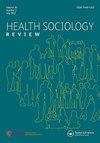‘Being defined’: large-bodied women’s experiences as healthcare consumers
IF 2.5
2区 医学
Q2 HEALTH POLICY & SERVICES
引用次数: 4
Abstract
ABSTRACT Despite an increasingly pathologised discourse on overweight and obesity, the clinical experiences of large bodied individuals remain relatively unexplored. In addition, interventions targeting overweight and obesity have generally failed to recognise the role that weight related discrimination and stigma play in both the uptake of interventions and the experience of healthcare consumers. This Australian research used a grounded theory approach, informed by constructivism, to further understanding and generate dialogue about the experiences of large bodied female healthcare consumers. Participants included 22 women, who were purposively sampled, all of whom identified as overweight or obese. Data was collected from two major sources: intensive interviews with participants and literature. For the participants in this study, being overweight or obese created a significant barrier to positive clinical interactions with their medical professionals. Women described their interactions with medical professionals, particularly general practitioners (GPs) as the most challenging to manage. Participants believed that when they became patients, they were defined by their body size, which worked to create a one-dimensional identity – that of a fat patient. These findings suggest that weight-related discrimination and stigma has a significant impact on both the clinical interaction, and the health and wellbeing of large bodied, female healthcare consumers.“被定义”:体型较大的女性作为医疗保健消费者的体验
尽管关于超重和肥胖的病理化论述越来越多,但体型较大的个体的临床经验仍然相对未被探索。此外,针对超重和肥胖的干预措施通常未能认识到与体重有关的歧视和污名在采取干预措施和医疗保健消费者的体验中所起的作用。这项澳大利亚的研究采用了一种扎根的理论方法,由建构主义提供信息,以进一步理解和产生关于大型女性医疗保健消费者经验的对话。参与者包括22名女性,她们都被确定为超重或肥胖。数据收集自两个主要来源:与参与者的密集访谈和文献。对于这项研究的参与者来说,超重或肥胖对他们与医疗专业人员进行积极的临床互动造成了重大障碍。妇女将她们与医疗专业人员,特别是全科医生的互动描述为最难管理的。参与者认为,当他们成为病人时,他们是由他们的体型来定义的,这就形成了一个一维的身份——一个肥胖的病人。这些研究结果表明,体重相关的歧视和污名对临床互动以及体型较大的女性保健消费者的健康和福祉都有重大影响。
本文章由计算机程序翻译,如有差异,请以英文原文为准。
求助全文
约1分钟内获得全文
求助全文
来源期刊

Health Sociology Review
Multiple-
CiteScore
7.50
自引率
0.00%
发文量
14
期刊介绍:
An international, scholarly peer-reviewed journal, Health Sociology Review explores the contribution of sociology and sociological research methods to understanding health and illness; to health policy, promotion and practice; and to equity, social justice, social policy and social work. Health Sociology Review is published in association with The Australian Sociological Association (TASA) under the editorship of Eileen Willis. Health Sociology Review publishes original theoretical and research articles, literature reviews, special issues, symposia, commentaries and book reviews.
 求助内容:
求助内容: 应助结果提醒方式:
应助结果提醒方式:


